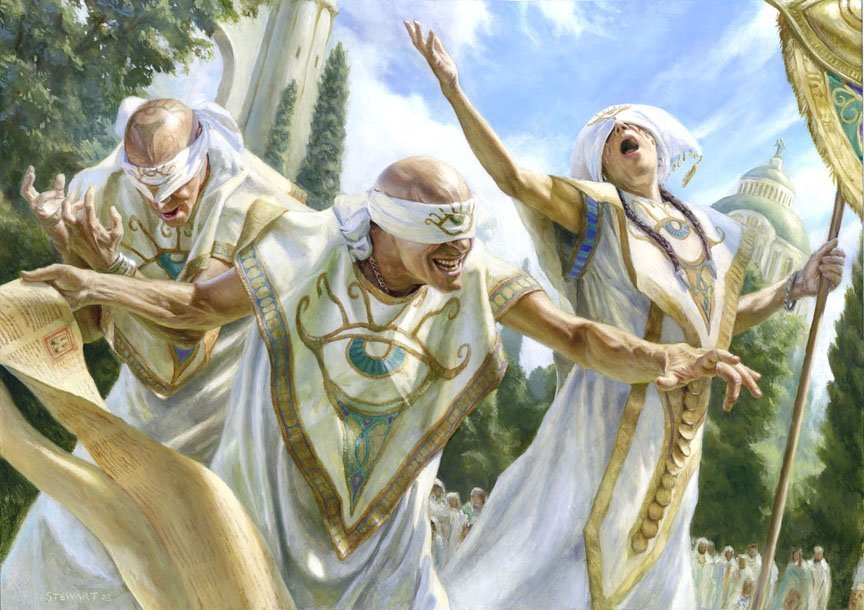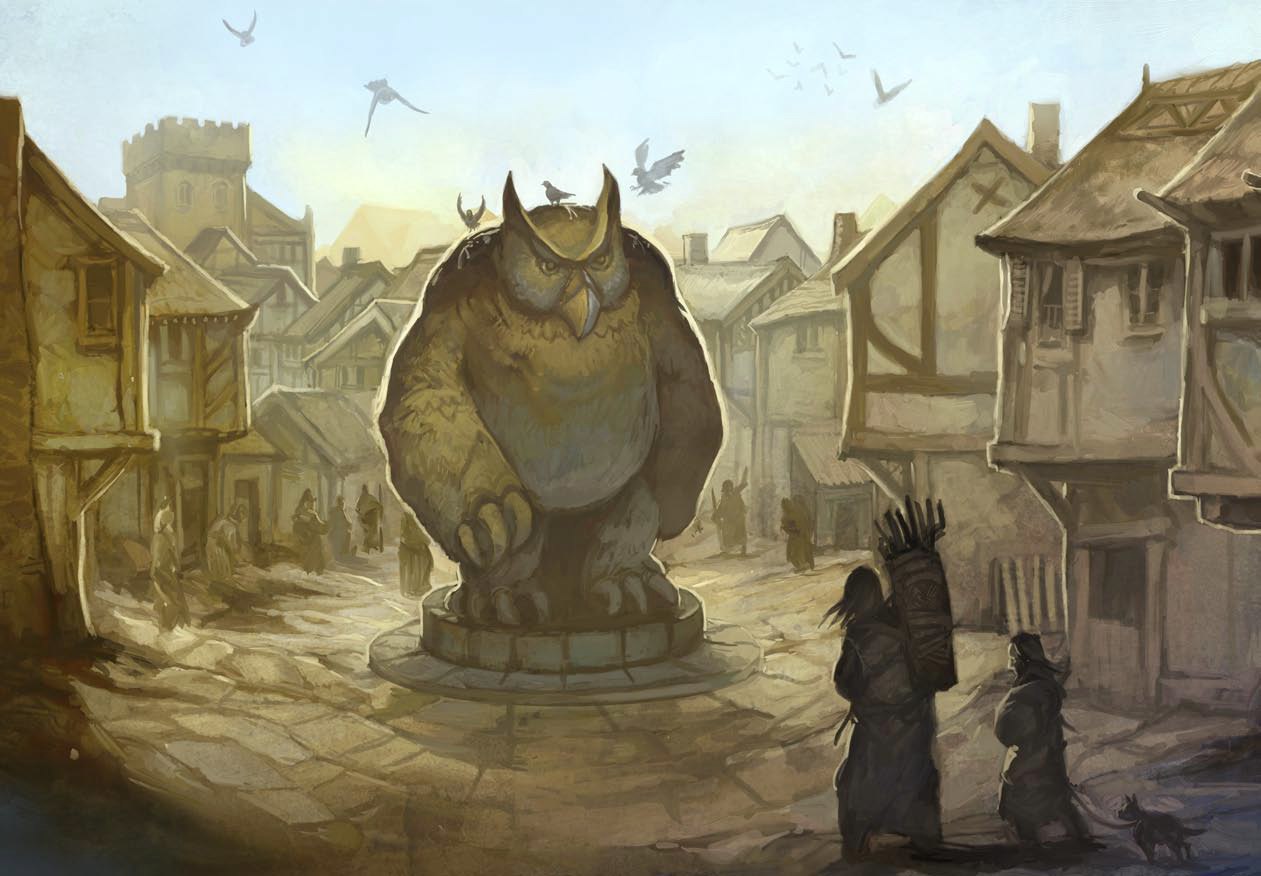Gods want some things to happen, and don't want other things to happen. If they want something to happen, whether they realize it or not, it will be reflected in the Weave. This way, one of the ways to figure out what is it they want is to use magic - divination magic, to be precise. Mostly, I've seen people say either that prophecy should come true no matter what, or that a prophecy could surely be changed, as long as it's well known. Personally, I always found the notion of unchanging prophecy as a removal of player's agency. Players would hate it if they saw that their actions are of little to no consequence, they want to change the world, and they won't stop at a prophecy. As one would expect, when a god's will is not acted out, something very bad happens.
How to break a prophecy
There's a variety of ways in which one could break a prophecy. First and foremost however, all of them must build on the prophecy itself, contradicting it in some way. After that is figured out, one must have enough willpower to break a prophecy. How much willpower must be shown depends on the significance of the event that's prophesied, power level of the spell it was made through, or the creature it was made through if magic wasn't used.When it comes to divinations, two kinds of exceptional creatures exist that wage eternal war. Celestials, who see all the possible futures at all times. They were created by gods to ensure their will coming true and to protect the flow of time. On the other hand, fiends are granted the power to disrupt foretold futures effortlessly. The exact reason why they might have been created is unknown.
When a creature tries to break a significant prophecy (DM's discretion) knowingly, it must first succeed on a Charisma saving throw of appropriate DC (DM's discretion). If it fails, it finds itself unwilling to break the prophecy, knowing it would undo the fate itself. Celestials automatically fail this saving throw, fiends automatically succeed this saving throw.
 |
| Dude, you seein' what I'm seein'? |
Rewards
This is fairly simple - the one who breaks a prophecy gets to decide how the fate should go. If you kill the prophecized child that was supposed to become king one day, you will have the most sway about who's going to be the next king, as far as the fate goes. If unused, you can save this potential for later use. However, the potential is expiring very quickly, so be wary.
Depending on the significance of the prophecized event, you get a certain amount of potential points. One point can be expended to gain a +1 bonus when making a skill check related to fixing what was prophecized, or to gain advantage when making a Charisma saving throw when breaking another prophecy. Only one potential point can be spent per turn. Precisely on midnight, any creature that has potential points will lose 1 point. Any creature can store only an amount of potential points equal to their Charisma modifier.
Risks
Undoing the fate is no joke, and when it's done a lot, the Weave gets tangled up into a form in which the fabric of spacetime itself is malformed. Effects like this aren't possible even with the use of magic, which is why these phenomena are not just called "paranormal", but "paramagical" instead. A much simpler and more often used term however is "time anomalies".When a lot of prophecies are undone in certain location, the time-space fabric itself will cease to work properly. Spheres of various sizes will start to appear all over the nearby area, each contradicting the time in some way. Now, the natural laws still apply to some extend, which is why there is a protective barrier around each of these spheres. Among the ones who are informed enough, it is known that one should not pass through these barriers, once the paramagical activity starts, for they'll be affected by the time flame (or as the proper term goes - chronofire barrier), which will burn anything and everything passing through it to mere ashes, including creatures immune to fire or magical items. Below are examples of the most common examples of paramagical activity. All of these however have one thing in common, and that is that everyone inside the sphere and outside the sphere perceives the same changes most of the time, and after the sphere disappears the real changes are reflected.
- The time inside/outside of the sphere seems to have stopped.
- The time inside/outside of the sphere seems to go in reverse.
- The time inside/outside of the sphere seems to be looping. (like real life gif, or groundhog's day)
- The time inside/outside of the sphere seems to go slower, while the time outside/inside the sphere seems to go faster.
- The creatures inside of the sphere disappear, and reappear only once the sphere returns.
- The inside/outside of the sphere is switched for another position in time. (example: at 7 AM, you see the sphere appear. Its insides are dark and there's a figure, you can't quite tell who it is. In the midnight, you go look there once again and see that you suddenly appear in the same room at 7 AM, seeing yourself looking back at you in surprise. You then realize that the figure was you all along.)
- A pair of spheres appears and disappears at the same time, with their contents switched.
The spheres are anywhere from 3 meters (10 feet) to a couple kilometers/miles in diameter. There is a warning sign that one is about to appear somewhere for 6 seconds, ethereally looking sphere, and as long as it's present, the sphere shows orange/blue lightnings over its surface rarely, with the lightnings becoming more and more dense locally as something approaches the barrier.
Anything that passes the chronofire barrier is burned to ashes. There are no dice rolled for this, it just happens. You stick your hand through it? Bye-bye hand. You throw your bag of holding through it? Welp say goodbye to that too, along with its contents. Not even adamantium is safe, and that is because the time is still stable enough to not allow that.
The spheres are dangerous. What should one do to fix this? Well...
Ritual of time fixing
This ritual has been figured out by elven researchers up to nine hundred years ago, though the one most credited for its discovery and formulation is Ravarie Petalfree, a wood elf who with help from her husband managed to fix time initially after a devil invasion and is for that forever remembered as a heroine.
As part of the ritual, a large clock with twelve marks for hours is drawn onto the ground. Twelve candles are put onto the hour marks, each representing two hours of the day. By each candle should stand one person. During the day starting at sunrise, each hour one candle should be lit, in order. The first candle is lit at the corresponding hour to the hour when sunrise occurred, most often this is between 5 and 8 o'clock in the morning (depends on the time of the year). Once the last candle is lit, Everyone says a magic phrase and must blow out all but one candle, the one candle being the closest to where the Sun physically is. If this ritual is done properly, all the spheres disappear and the time-space continuum is restored.
(Thanks to Jojirus for helping me out with the ritual!)
How to ensure a prophecy will come true?
There was a tiny loophole mentioned in the mechanics. In order to break the prophecy, you have to know it. What this means is that the fewer people know of a prophecy, the higher the probability that the prophecy comes true. The most important prophecies are thus generally kept hidden as much as they could be - for example a prophet's mind is wiped clean if he sees the greatest king's birth, the scrolls are entombed in detection-resistant safes with layers of lead and adamantium, and if someone who shouldn't know it and has a tongue too loose figures out... well, it's time for assassins to strike. This is one of the reasons why the prophets are often dubbed as mad - they miss portions of their minds they'll never get back.
This is also why the portents of divination wizards work so well - only they saw them, they do not share them with anyone until they come true.
Of course, seers and prophets figured out a way to protect themselves from getting their memories of a prophecy wiped - vagueness. If the prophecy is too hard to understand or just too uncertain, judging mages will let it pass. "Look, I have no clue what he means by 'silver mask will save golden kingdom', so I guess it's not that big of a deal for him to remember." Ever since, prophecies of experienced prophets are getting more and more vague, to the point where mages believe part of divination rituals is the consumption of magical fungi.
As it goes though, fiends are of course an exception to this. They can break a prophecy even if they have no clue of it.
Another exception would be the Psyche Controllers. They can break prophecies unknowingly.
This is also why the portents of divination wizards work so well - only they saw them, they do not share them with anyone until they come true.
Of course, seers and prophets figured out a way to protect themselves from getting their memories of a prophecy wiped - vagueness. If the prophecy is too hard to understand or just too uncertain, judging mages will let it pass. "Look, I have no clue what he means by 'silver mask will save golden kingdom', so I guess it's not that big of a deal for him to remember." Ever since, prophecies of experienced prophets are getting more and more vague, to the point where mages believe part of divination rituals is the consumption of magical fungi.
As it goes though, fiends are of course an exception to this. They can break a prophecy even if they have no clue of it.
Another exception would be the Psyche Controllers. They can break prophecies unknowingly.
 |
| Three guys playing hide and seek. With the fate. |
Thank you all for reading, and thanks to Hoff for proofreading! Have a nice day!









